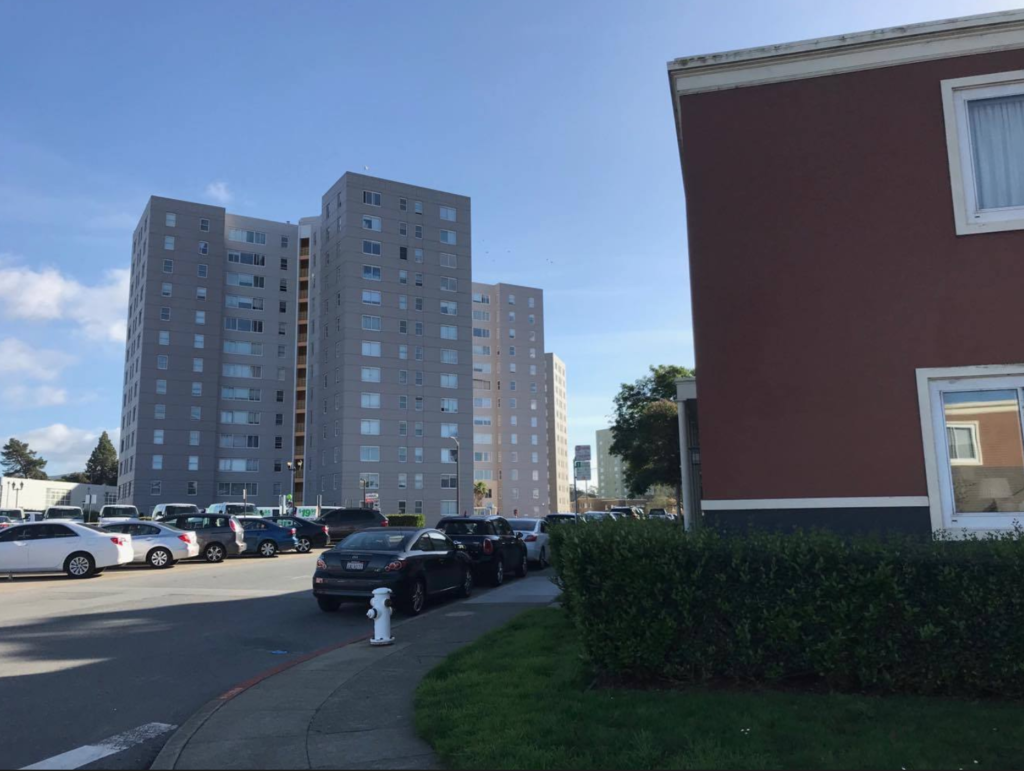
Construction in Parkmerced, the sprawling apartment complex located next to Lake Merced in southwest San Francisco, will begin in the spring of 2018, kicking off a 20 to 30 year redevelopment process.
Maximus Real Estate Partners, the company that owns Parkmerced, will construct several new high rises, adding 5,679 new apartments for a total of 8,900, almost triple the current 3,221 units. Other planned amenities include community gardens, open spaces such as playing fields and bicycle paths, rerouting the MUNI Metro M Ocean View line so that it passes through the development, and increasing the neighborhood’s sustainability through measures like installing solar panels and wind turbines and restoring a wetland located on site.
While these planned improvements are certainly attention-grabbing, its tenants’ main focus is ensuring that current residents are not displaced during the process.
The construction requires the demolition of 1,538 existing townhomes, where many long-term tenants live. The legally binding development agreement between the City and the developers requires that tenants who rent demolished units be given the opportunity to relocate to designated replacement units in the newly constructed towers. The replacement units must be of the same size (square footage and bedroom/bathroom number) as the original units.
Due to a statewide bill passed in 1995—the Costa-Hawkins Act, single family homes and apartments constructed from 1996 onward are exempt from rent control. However, because the City of San Francisco is contributing to its redevelopment, relocated tenants will pay the same rent on their new replacement unit that they paid for originally, further protecting them from displacement.
Rent control is hugely significant to Bridget Arroyo, who has lived in the complex for 42 years and raised her children in her townhome. Without it, “there’s no way I could have lived here as long as I did.”
“They’ve reassured us that we will remain under rent control, we’ll be grandfathered in under our [current] rent, and the rent control maximum limit will continue to apply,” Arroyo said. “That’s really important to me.”
While Joy Lee, a community organizer with the Housing Rights Committee of San Francisco, likes to think that the developers will follow through with these promises to tenants like Arroyo, she wants as many people as possible to monitor the development process to ensure they are held accountable.
“We’re trying to reach out to more people there and make sure they know about the development plans,” Lee said. “The more people who know, the more they can hold them accountable. If no one’s paying attention to this, it’s more likely that they won’t follow through with their promises.”
However, many tenants don’t know about the upcoming project; Lee estimated that about seven out of every 10 Parkmerced residents she spoke to were unaware of it.
Alex Gulakov, who has lived in Parkmerced for two and a half years, said that he didn’t know much about the development besides that “they’re just trying to make it better.” He didn’t know that his townhome would be demolished, but when he heard that they would all be torn down over the next several decades, said that “in 20 or 30 years if this place is torn down that’s fine, [as long as] they’re just not being torn down now.”
Arroyo has been learning about the redevelopment through newsletters Parkmerced sends out several times a year and knows that “they’re taking all of the townhouses down and then they’re going to build up.”
“The whole project, from what I understand is supposed to take 20-plus years,” Arroyo said. “So, having lived here as long as I have, until they notify me, which they’ve advised us they’re going to do at least a year in advance of when you’re impacted, about where we’ll be moving, until all of that happens, I’m following it but I’m not really concerned about it.”
Lee’s goal is to make sure tenants know their rights and that they will be protected during the redevelopment.
“If tenants have any issues, even just questions, they can call us,” she said. “I know it’s going to be a long process, but we’ll be here and we’re going to make sure that the developers are realizing all the promises that they gave to tenants.”

